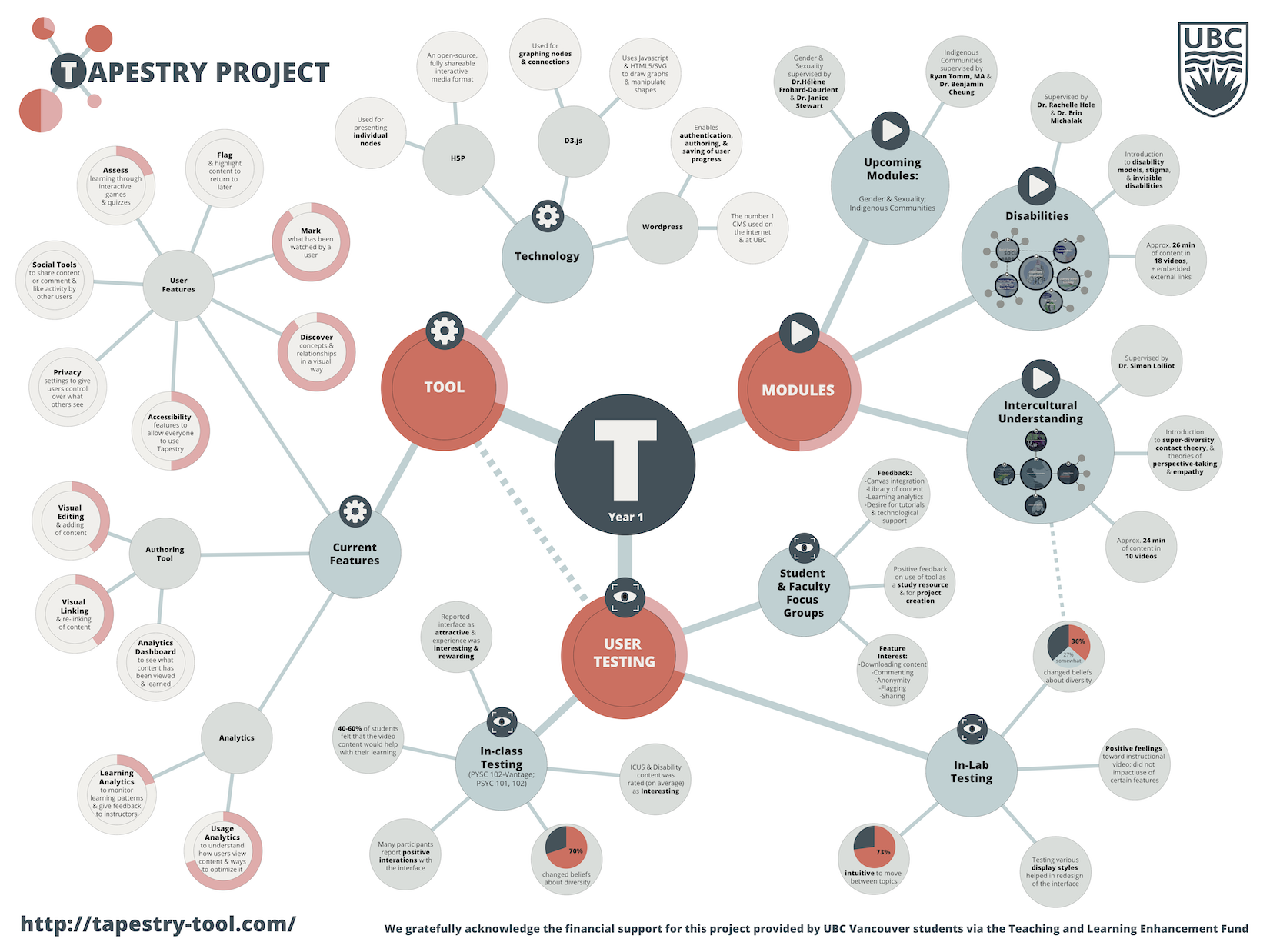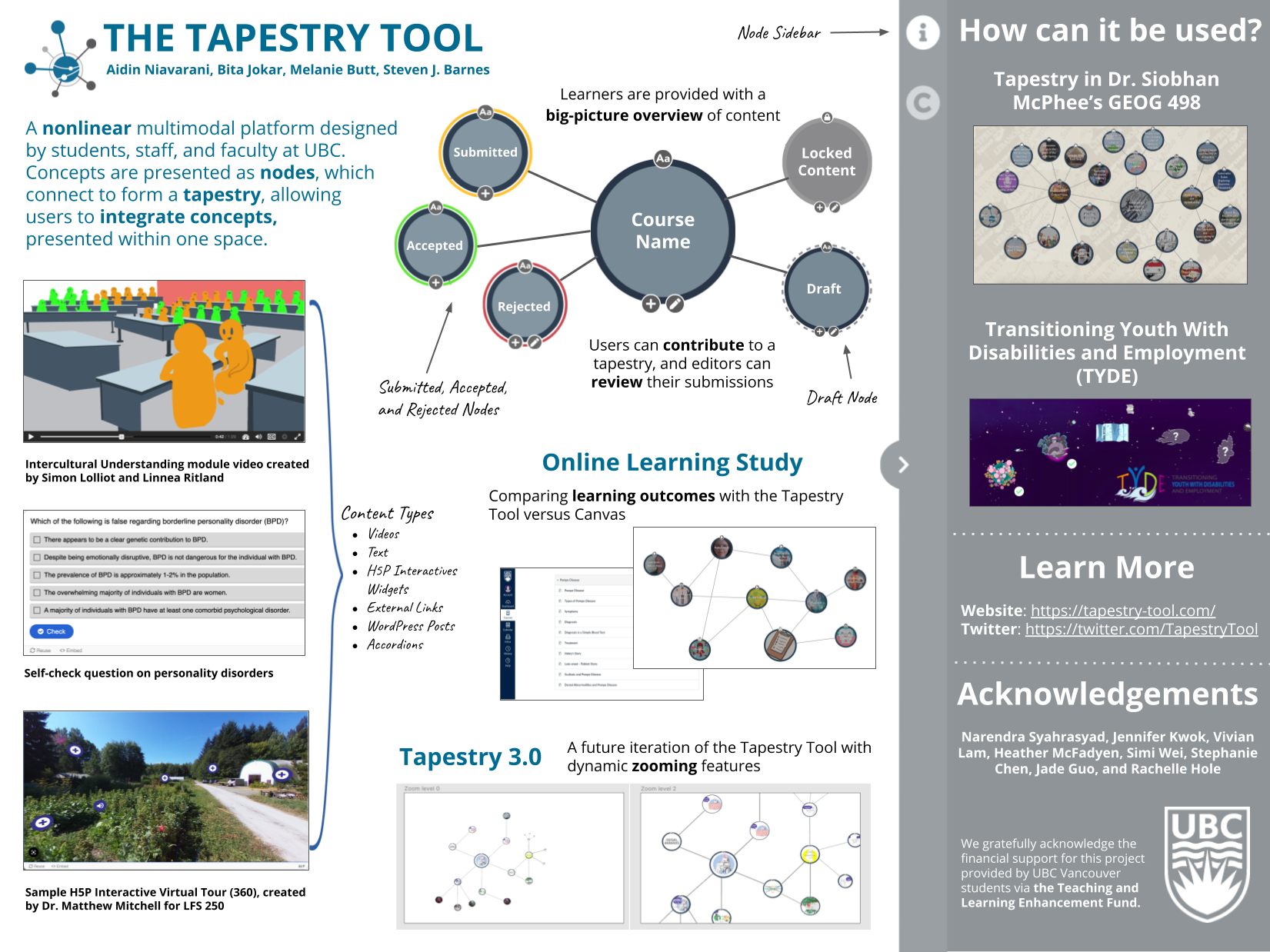| Title | Tapestry: Enabling Interactive, Remixable, Reusable, and Extensible Open Educational Modules |
|---|---|
| Faculty/College/Unit | Arts |
| Status | Completed |
| Duration | 3 Years |
| Initiation | 04/01/2018 |
| Completion | 03/31/2022 |
| Funding Details | |
| Year 1: Project Year | Year 1 |
| Year 1: Funding Year | 2018/2019 |
| Year 1: Project Type | Large TLEF |
| Year 1: Principal Investigator | Steven Barnes |
| Year 1: Funded Amount | 84,822 |
| Year 1: Team Members | Steven Barnes, Instructor, Psychology, Faculty of Arts |
| Year 1: Summary | With online content becoming ubiquitous in many UBC courses, there is a need to reconsider how such content is created and how it might be better leveraged to improve learning outcomes. The present project proposes to build a new tool, called Tapestry (tapestry-tool.com), that will enable a novel development model for online course content: One that is learner-centred, constructivist, and emphasizes student-faculty co-creation and reusability. Tapestry will allow for the production of interactive, remixable, reusable, and extensible educational modules. In addition to Tapestry, we will also develop four interactive educational modules for use within Tapestry. Each module will deal with one aspect of living in a diverse world: (1) Intercultural Understanding; (2) Gender and Sexuality; (3) Indigenous Communities, and (4) Invisible Disabilities. Taken together, these major project outputs will encourage new modes of teaching and learning and also foster diverse and inclusive environments for UBC community members. |
| Year 1: TLEF Showcase |  |
| Year 2: Project Year | Year 2 |
| Year 2: Funding Year | 2019/2020 |
| Year 2: Project Type | Large TLEF |
| Year 2: Principal Investigator | Steven Barnes |
| Year 2: Funded Amount | 100,949 |
| Year 2: Team Members | Steven Barnes, Instructor, Psychology, Faculty of Arts |
| Year 2: Summary | With online content becoming ubiquitous in many UBC courses, there is a need to reconsider how such content is created and how it might be better leveraged to improve learning outcomes. The present project is working to develop a tool, called Tapestry, that will enable a novel development model for online course content: One that is learner-centred, constructivist, and emphasizes student-faculty co-creation and reusability. Tapestry will allow for the production of interactive, remixable, reusable, and extensible educational modules. In addition to the Tapestry interface, we are also developing four interactive educational modules for use within Tapestry. Each module will deal with one aspect of living in a diverse world: (1) Intercultural Understanding; (2) Gender and Sexuality; (3) Indigenous Communities, and (4) Disabilities. Taken together, these major project outputs will encourage new modes of teaching and learning and also foster diverse and inclusive environments for UBC community members. |
| Year 2: TLEF Showcase |  |
| Year 3: Project Year | Year 3 |
| Year 3: Funding Year | 2020/2021 |
| Year 3: Project Type | Large TLEF |
| Year 3: Principal Investigator | Steven Barnes |
| Year 3: Funded Amount | 63,728 |
| Year 3: Team Members | Steven Barnes, Instructor, Psychology, Faculty of Arts |
| Year 3: Summary | Online content is prevalent in UBC courses, however content presentation and student-content interactions have seen very little progress away from standard video or talking head formats. The focus of the current project, Tapestry (see tapestry-tool.com), is to develop a tool (the ‘Tapestry Tool’) that allows for novel online course-content creation and interaction, with a special emphasis on student-faculty co-creation and reusability. The Tapestry Tool will allow for the production of interactive, remixable, reusable, and extensible educational modules (aka ‘tapestries’). The Tapestry Tool can be used by instructors or students to modify or create content and interconnections amongst content. Four tapestries will be developed, each dealing with one aspect of living in a diverse world (aka the ‘diversity tapestries’): (1) Intercultural Understanding; (2) Gender & Sexuality; (3) Indigenous Communities, and (4) Disabilities. We can envision the Tapestry Tool and/or these four diversity tapestries being used in many UBC courses. The Tapestry Tool will encourage non-linear, interactive, and evolving modes of teaching and learning. |